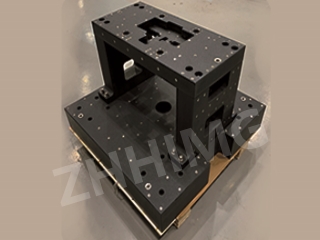In the key link of chip manufacturing - wafer scanning, the accuracy of the equipment determines the quality of the chip. As an important component of the equipment, the thermal expansion problem of the granite machine base has attracted much attention.
The coefficient of thermal expansion of granite is usually between 4 and 8×10⁻⁶/℃, which is much lower than that of metals and marble. This means that when the temperature changes, its size changes relatively little. However, it should be noted that low thermal expansion does not mean there is no thermal expansion. Under extreme temperature fluctuations, even the slightest expansion may affect the nanoscale accuracy of wafer scanning.
During the wafer scanning process, there are multiple reasons for the occurrence of thermal expansion. The temperature fluctuations in the workshop, the heat generated by the operation of equipment components, and the instantaneous high temperature brought by laser processing will all cause the granite base to "expand and contract due to temperature changes". Once the base undergoes thermal expansion, the straightness of the guide rail and the flatness of the platform may deviate, resulting in inaccurate movement trajectory of the wafer table. The supporting optical components will also shift, causing the scanning beam to "deviate". Working continuously for a long time will also accumulate errors, making the accuracy worse and worse.
But don't worry. People already have solutions. In terms of materials, granite veins with a lower coefficient of thermal expansion will be selected and subjected to aging treatment. In terms of temperature control, the workshop temperature is precisely controlled at 23±0.5℃ or even lower, and an active heat dissipation device will also be designed for the base. In terms of structural design, symmetrical structures and flexible supports are adopted, and real-time monitoring is carried out through temperature sensors. The errors caused by thermal deformation are dynamically corrected by algorithms.
High-end equipment such as ASML lithography machines, through these methods, keep the thermal expansion effect of the granite base within an extremely small range, enabling the wafer scanning accuracy to reach the nanometer level. Therefore, as long as it is properly controlled, the granite base remains a reliable choice for wafer scanning equipment.
Post time: Jun-12-2025

